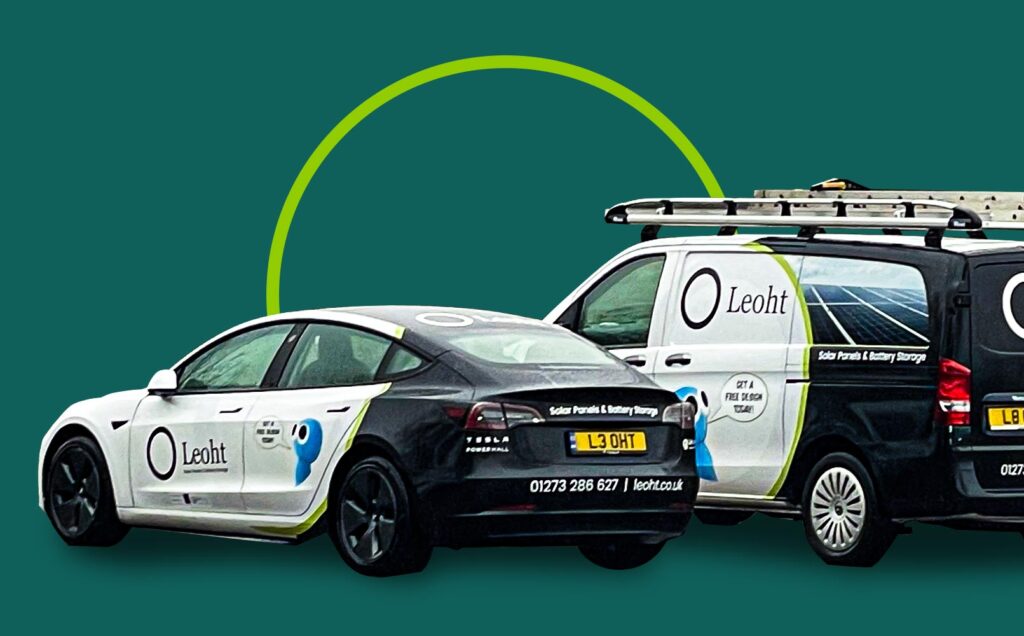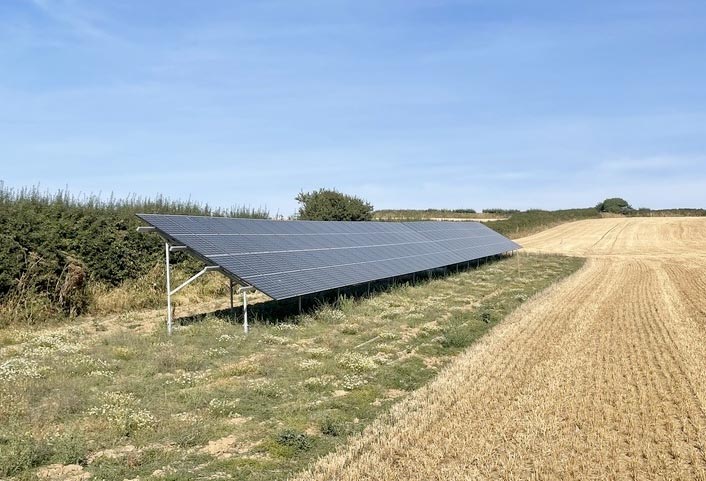At Leoht, we pride ourselves on our in-house training, ensuring seamless collaboration between our designers and installation teams, led by Kyle Merryweather.
Tailored to meet your specific needs, our flexible approach accommodates the unique challenges of each roof, guaranteeing excellence in every project, whether it’s a 3 kW home setup or a 50 kW commercial system.


Our founder, Thomas Moyes’ initial ambition was to free his parents from monthly utility bills before their retirement – creating a lifestyle with zero monthly bills. Little did he realise then just how much utility costs would skyrocket, making our timing fortuitous.
In January 2020, we started our journey into sustainable energy with our first solar and battery installation at their property (right). Now, their electricity costs don’t just break even; they’ve swung into the negative territory, thanks to a surplus of exported power and a successful switch to Octopus Flux.
Leoht is now run by Kyle Merryweather – perfect name for solar!
Leoht’s mission is simple, to accelerate the adoption of residential renewable energy in the UK and increase people’s self-sufficiency.
We’ll achieve this by providing homeowners with high performing – quality solar power systems in a way that is clear and transparent, with projections that are accurate and prices that are competitive. So that customers will love and recommend the systems to their friends and neighbours.
We aim to provide the best customer experience in the industry by involving the customer in the design of their system, using technology to identify the best performing system for your roof and then expertly installed by full time employees.




A solar inverter’s maximum output DOES NOT relate to the solar capacity able to be installed. Getting AC output confused with the DC capacity of the solar array could cost you £000’s in the long run by not using the...
An electric car will on average travel 3-4 miles per kWh, depending on driving habits and driving conditions. I have had my Tesla model 3 for 3 years and over this time I have averaged just over 4 miles per...
The solar panel inverter is the most important part of your solar system – choose a good one. Solar panel inverters convert DC electricity generated by your solar panels into AC to be used in the home. They monitor your...
Are flat roofs suitable for solar panels? When would you consider a flat roof solar panel system? Flat roof solar panels are used to maximise solar generation from a dormer, flat roof extension or garage roof. Flat roof solar panels...
How to compare solar panels We’re all taught to believe that, for the most part, bigger is better – and you’d be forgiven for thinking the same when it comes to solar capacity. A larger capacity should mean more power,...
How many solar panels do I need? Most domestic installations fall between 6 – 24 solar panels. You will need 10 solar panels to generate the equivalent amount of electricity that an average home uses per year. You are not...
A solar inverter’s maximum output DOES NOT relate to the solar capacity able to be installed. Getting AC output confused with the DC capacity of the solar array could cost you £000’s in the long run by not using the...
An electric car will on average travel 3-4 miles per kWh, depending on driving habits and driving conditions. I have had my Tesla model 3 for 3 years and over this time I have averaged just over 4 miles per...
The solar panel inverter is the most important part of your solar system – choose a good one. Solar panel inverters convert DC electricity generated by your solar panels into AC to be used in the home. They monitor your...
Are flat roofs suitable for solar panels? When would you consider a flat roof solar panel system? Flat roof solar panels are used to maximise solar generation from a dormer, flat roof extension or garage roof. Flat roof solar panels...
How to compare solar panels We’re all taught to believe that, for the most part, bigger is better – and you’d be forgiven for thinking the same when it comes to solar capacity. A larger capacity should mean more power,...
The Feed in Tariff ended in 2019 and was replaced by the Smart Export Guarantee. Octopus Outgoing currently pays 15p/kWh and as high as 30p/kWh on Octopus Flux for exported electricity. E On pays 16.5p/kWh. Now export rates have improved...
In 1921, Albert Einstein won his first and only Nobel prize for his work on describing the photoelectric effect. Light (a beam of particles) knocks loose electrons from the solar cell, the solar cell then directs these electrons along a...
Solar panels in England will generate between 15-27% as much electricity in the winter compared to their summer peak, depending on the direction they face, pitch and shading. North facing solar panels will produce just 6% compared to the energy...
Installing solar panels and battery storage will make an immediate impact on your energy bills, no matter what tariff you choose. Did you know that the difference between electricity tariffs could be hundreds of pounds a year. It’s worth taking...

© Leoht 2024 | All Rights Reserved | Privacy Policy
Website by Think Creative